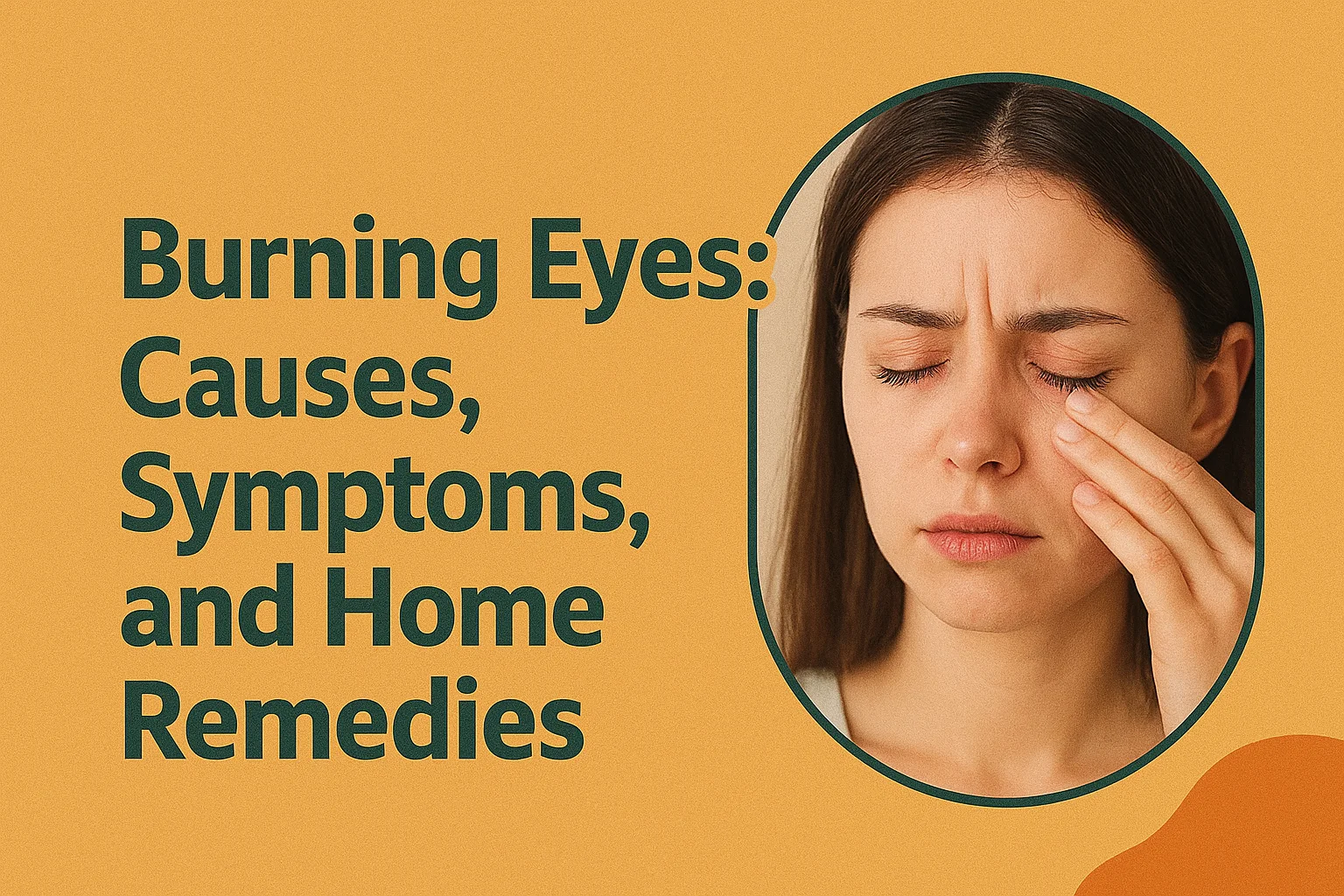Many people experience burning eyes at some point in their life. Sometimes it feels like a mild irritation, while in other cases it can be uncomfortable enough to interfere with daily activities. This condition can happen due to dryness, allergies, infections or even lifestyle habits like spending too much time in front of screens.
In this article, we will look into the causes of burning eyes, symptoms to watch for, when it may be linked to other health issues and most importantly, some safe burning eyes home remedies that you can try for relief.
Understanding Burning Eyes
The sensation of burning, stinging, or irritation in the eyes can happen suddenly or develop gradually. Many people ask, “Why do eyes burn?” The truth is, there isn’t just one answer. It can be as simple as exposure to dust or smoke, or it may point to an underlying condition that needs medical care.
Your eyes are very delicate, and even small changes in your environment—such as dry air, pollution, or a lack of sleep—can trigger discomfort. Recognizing the exact cause helps in choosing the right treatment.
What are the Common Burning Eyes Causes?
There are several reasons behind burning eyes, and often more than one factor can contribute. Below are some of the most frequent causes explained in detail.
1. Dry Eyes
Dryness is one of the most common burning eyes causes. This happens when your tear glands don’t produce enough tears, or the tears evaporate too quickly. People who spend long hours in front of screens, live in air-conditioned rooms, or wear contact lenses are more likely to experience dry eyes.
If you work on a computer for 8–10 hours without taking breaks, you may notice a burning sensation in eyes by evening. This is due to reduced blinking, which lowers tear moisture.
2. Allergies
Eye allergies, also called allergic conjunctivitis, occur when your eyes react to pollen, dust, pet dander, or mold. Along with burning, you may also notice redness, itching, and watery discharge.
3. Eye Infections
Bacterial or viral infections like conjunctivitis (pink eye) can cause swelling, redness, and burning. Eye infections need proper medical treatment because they may worsen if ignored.
4. Environmental Factors
Smoke, pollution, strong winds, or exposure to chemical fumes can irritate the eyes. Even swimming in chlorinated pools can lead to burning eyes after waking up the next morning.
5. Eye Strain
Reading in low light, using digital devices for long periods, or improper eyeglasses prescription can put pressure on your eyes and lead to burning and discomfort.
6. Medical Conditions
Certain health issues such as blepharitis (inflammation of eyelids), autoimmune disorders like Sjögren’s syndrome, or even sinus problems can trigger burning eyes symptoms.
What are the Burning Eyes Symptoms?
While the main complaint is usually a burning sensation in eyes, other symptoms can appear alongside depending on the cause.
- Redness or bloodshot appearance
- Excessive tearing or watery eyes
- Itching and irritation
- Sensitivity to light
- Gritty feeling, as if something is stuck in the eye
- Blurred vision (in severe cases)
- Swelling of eyelids
It’s important to note that sometimes burning eyes and fever may occur together. This can be a sign of a viral or bacterial infection. If you notice fever, pus-like discharge, or worsening pain, you should consult a doctor immediately.
When Burning Eyes Happen at Specific Times?
Many people notice burning eyes after waking up, which can be linked to:
- Sleeping in a dry, air-conditioned room
- Using ceiling fans that dry out natural tears
- Night-time allergies from dust mites in bedding
- Incomplete eyelid closure during sleep
Making small lifestyle adjustments—like using a humidifier in your bedroom or washing pillow covers regularly—can often reduce this morning discomfort.
What are the Home Remedies of Burning Eyes?
If your symptoms are mild and not linked to a serious infection, several burning eyes home remedy options can bring relief.
1. Cold Compress
Applying a clean, cold washcloth over your closed eyelids can calm irritation and reduce swelling. This is especially effective if burning is due to allergies or tired eyes.
2. Artificial Tears
Over-the-counter lubricating eye drops help restore moisture, making them useful for dryness caused by long hours of screen time.
3. Cucumber Slices
Placing chilled cucumber slices on your eyelids not only refreshes your eyes but also reduces burning and puffiness.
4. Rose Water
Rose water is traditionally used to soothe tired eyes. You can soak cotton pads in chilled rose water and place them on your eyelids for a cooling effect.
5. Aloe Vera Gel
Diluted aloe vera extract, when applied around the eyes (not directly inside) may provide relief due to its natural anti-inflammatory properties.
6. Warm Compress
If your burning eyes causes are linked to blocked oil glands (like blepharitis), a warm compress can help open them and restore proper tear film balance.
7. Stay Hydrated
Dehydration can worsen eye dryness. Drinking plenty of water throughout the day ensures your eyes stay moist.
8. Adjust Screen Habits
Follow the “20-20-20 rule”: every 20 minutes, look at something 20 feet away for 20 seconds. This prevents digital eye strain.
Medical Treatment Options
If home remedies don’t help or if your burning eyes symptoms worsen, medical care is necessary. Possible treatments include:
- Prescription Eye Drops: For infections, allergies, or inflammation.
- Antibiotics or Antivirals: If burning is caused by bacterial or viral conjunctivitis.
- Allergy Medications: Antihistamines can reduce allergic reactions.
- Specialized Dry Eye Therapy: Such as punctal plugs (to block tear drainage) or prescription tear-stimulating medications.
Prevention Tips for Burning Eyes
- Always wear sunglasses outdoors to protect from UV rays, dust, and wind.
- Limit screen exposure and maintain proper screen distance.
- Use protective eyewear when working with chemicals or swimming.
- Maintain good eye hygiene by not rubbing your eyes with dirty hands.
- Keep your environment clean and dust-free.
When to See a Doctor?
You should seek medical help if:
- Burning persists for more than a few days despite home care.
- You experience sudden vision changes or severe eye pain.
- There is thick, yellow or green discharge.
- Burning occurs with fever and overall weakness.
Conclusion
Burning eyes is a common but uncomfortable condition that can happen due to dryness, allergies, infections, or environmental factors. Understanding the causes and recognizing related burning eyes symptoms is the first step to finding relief.
For mild cases, simple home remedy options like cold compresses, rose water, and artificial tears can make a big difference. However, if you also have burning eyes and fever, worsening redness, or vision changes, it’s essential to see a doctor.
By making small lifestyle changes, protecting your eyes and seeking timely treatment, you can prevent irritation and keep your eyes healthy. So, the next time you ask, “Why do eyes burn?”, you’ll know the answer—and how to handle it effectively.
Frequently Asked Questions
1. What is burning eyes a symptom of?
It can be a symptom of several conditions, including dry eye syndrome, allergies, infections like conjunctivitis, eye strain, or exposure to smoke and pollution. In some cases, it may also be linked to underlying health problems such as autoimmune disorders or vitamin deficiencies.
2. What deficiency causes burning eyes?
Vitamin A deficiency is one of the most common nutritional deficiencies that can lead to burning eyes symptoms. Low levels of omega-3 fatty acids and vitamin D may also worsen dryness and irritation, contributing to eye discomfort.
3. Are burning eyes a symptom of diabetes?
Yes, in some cases. People with uncontrolled diabetes are more likely to develop dry eyes due to nerve damage that reduces tear production. This dryness can cause a burning sensation in eyes along with redness and blurred vision.
4. Are burning eyes a symptom of low iron?
Indirectly, yes. Low iron levels can lead to anemia, which reduces oxygen supply to body tissues, including the eyes. This may cause fatigue, paleness, and sometimes burning eyes or dryness due to poor circulation.
5. What autoimmune disease causes burning eyes?
Autoimmune conditions like Sjögren’s syndrome, lupus, and rheumatoid arthritis can cause chronic eye dryness and irritation, leading to burning eyes symptoms. These diseases affect tear gland function, making the eyes more vulnerable to burning and stinging sensations.




